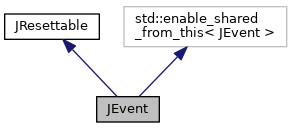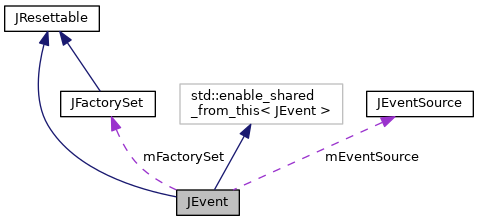|
|
| JEvent (JApplication *aApplication=nullptr) |
| |
|
void | SetFactorySet (JFactorySet *aFactorySet) |
| |
| template<class T > |
| JFactoryT< T > * | GetFactory (const std::string &tag="", bool throw_on_missing=false) const |
| | GetFactory() should be used with extreme care because it subverts the JEvent abstraction. More...
|
| |
| template<class T > |
| std::vector< JFactoryT< T > * > | GetFactoryAll (bool throw_on_missing=false) const |
| | GetFactoryAll returns all JFactoryT's for type T (each corresponds to a different tag). More...
|
| |
|
template<class T > |
| JMetadata< T > | GetMetadata (const std::string &tag="") const |
| | GetMetadata() provides access to any metadata generated by the underlying JFactory during Process()
|
| |
|
template<class T > |
| JFactoryT< T > * | Get (const T **item, const std::string &tag="") const |
| | C-style getters.
|
| |
|
template<class T > |
| JFactoryT< T > * | Get (std::vector< const T * > &vec, const std::string &tag="") const |
| |
|
template<class T > |
| void | GetAll (std::vector< const T * > &vec) const |
| | GetAll returns all JObjects of (child) type T, regardless of tag.
|
| |
|
template<class T > |
| const T * | GetSingle (const std::string &tag="") const |
| | C++ style getters.
|
| |
|
template<class T > |
| std::vector< const T * > | Get (const std::string &tag="") const |
| |
|
template<class T > |
| JFactoryT< T >::PairType | GetIterators (const std::string &aTag="") const |
| |
|
template<class T > |
| std::vector< const T * > | GetAll () const |
| | GetAll returns all JObjects of (child) type T, regardless of tag.
|
| |
|
template<class T > |
| std::map< std::pair< std::string, std::string >, std::vector< T * > > | GetAllChildren () const |
| |
| template<class T > |
| JFactoryT< T > * | Insert (T *item, const std::string &aTag="") const |
| | Insert() allows an EventSource to insert items directly into the JEvent, removing the need for user-extended JEvents and/or JEventSource::GetObjects(...) Repeated calls to Insert() will append to the previous data rather than overwrite it, which saves the user from having to allocate a throwaway vector and requires less error handling. More...
|
| |
|
template<class T > |
| JFactoryT< T > * | Insert (const std::vector< T * > &items, const std::string &tag="") const |
| |
|
void | SetRunNumber (uint32_t aRunNumber) |
| |
|
void | SetEventNumber (uint64_t aEventNumber) |
| |
|
void | SetJApplication (JApplication *app) |
| |
|
void | SetJEventSource (JEventSource *aSource) |
| |
|
uint32_t | GetRunNumber () const |
| |
|
uint64_t | GetEventNumber () const |
| |
|
JApplication * | GetJApplication () const |
| |
|
JEventSource * | GetJEventSource () const |
| |
|
template<class S > |
| std::map< std::pair< std::string, std::string >, std::vector< S * > > | GetAllChildren () const |
| |
|
virtual void | Release (void) |
| |
|
virtual void | Reset (void) |
| |


 Public Member Functions inherited from JResettable
Public Member Functions inherited from JResettable